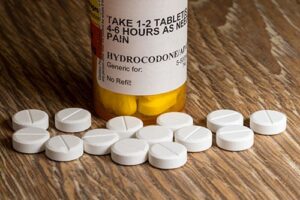Millions of people go to the doctor every year for pain from an injury or illness. Many others receive medicine for pain following surgery. Most physicians rely on hydrocodone to relieve that pain, but it can cause dependency. Whether they take it too long or abuse it, millions of people need hydrocodone addiction treatment.
Understanding Hydrocodone and Addiction
Hydrocodone is a semi-synthetic opioid that drug makers combine with ibuprofen to make Lortab, Norco, and Vicodin brands. However, Zohydro is a pure hydrocodone brand. Although the drug is very effective as a painkiller, it has a high risk for abuse and addiction. The opioid connects to receptors in the brain and spinal cord. This action interferes with pain signals, changing how people perceive and react to pain. If they like the euphoric feeling that hydrocodone produces, they may use it longer than their doctor recommends or in larger doses. In some cases, they use the drug in unintended ways, such as crushing and snorting the pills. Over time, people who abuse or continue using hydrocodone build a tolerance to it. Because of that, they have to take higher doses to achieve the same pain-relieving or euphoric effects. When an opioid addiction develops with prolonged use, people lose the option to stop using drugs. It becomes a compulsive behavior even when they want to quit, so they need hydrocodone addiction treatment.
What to Expect During Hydrocodone Addiction Treatment
Recovering from hydrocodone addiction starts with medical detox programs. Afterward, people need therapy at a rehab program. Although many people have heard that, they hesitate to get help because they don’t know what to expect. Learning more could put most concerns to rest.
Detox
Medical detox is always the first step in hydrocodone addiction treatment. People can’t begin to heal the mental aspects of addiction until they address the physical effects. Since detox involves withdrawal, having medical supervision ensures that they stay safe. The withdrawal symptoms that hydrocodone causes are often very uncomfortable. It’s common for people to relapse when they try to quit without help. They want to stop the withdrawal symptoms by taking more drugs, but doing that can lead to overdose. Taking too much hydrocodone could cause breathing problems, coma or death. During medical detox, doctors and nurses monitor symptoms and prevent complications. They often provide medicines to relieve nausea, vomiting, seizures, anxiety, muscle pain, and cravings. The process lasts an average of eight days, but anxiety could persist for about a month.
Therapy
When people are stable after detox, the second phase of hydrocodone addiction treatment is rehab. The psychotherapy that rehab programs provide helps address the underlying cause of the addiction. It also guides them to make lifestyle changes and learn skills that promote ongoing recovery. Residential rehab programs bring people into structured, drug-free environments for the duration of treatment. These are more successful than outpatient rehab programs because they eliminate all drug influences. Outpatient care gives people the freedom to live at home, but home isn’t always the best environment for recovery. Nearly every rehab center offers cognitive behavioral therapy (CBT) because it’s so successful at helping people with addiction. The theory behind it is that negative thoughts influence negative feelings and vice versa. These produce negative behaviors. CBT focuses on changing these negative elements to improve behavior. However, CBT doesn’t work for everyone. Because of that, therapists may use dialectical behavior therapy (DBT), which improves self-esteem. Holistic therapy, such as acupuncture and meditation, are other therapeutic techniques. Also, many rehab centers offer experiential therapy to help people overcome repressed feelings or traumatic events. This method helps them experience positive emotions as well, such as calm, forgiveness, and love. Some examples of experiential activities include creative pursuits like art or poetry and outdoor activities such as team ropes courses, which are also beneficial.
Get Treatment for Hydrocodone Addiction at Santé Center for Healing
If you or a loved one has a hydrocodone use disorder, don’t wait any longer to seek help. Santé Center for Healing offers caring addiction treatment in Argyle, Texas, which is about 40 miles from the Dallas/Fort Worth area. What makes our team so great, however, is that we use a customized approach to treatment. No two people or addictions are the same, and we want to make sure that we address your specific needs. The treatment plan that we create for you may combine medication, a 12-step program, and various therapies. In fact, we offer a range of therapies to ensure that we can treat as many diverse people as possible, including:
- Neurofeedback
- Art therapy
Don’t let hydrocodone or any other drug dictate where or when your life ends. Get the hydrocodone addiction treatment that you need today. Call 866-238-3154 to let Santé Center for Healing help you start the healing process.






